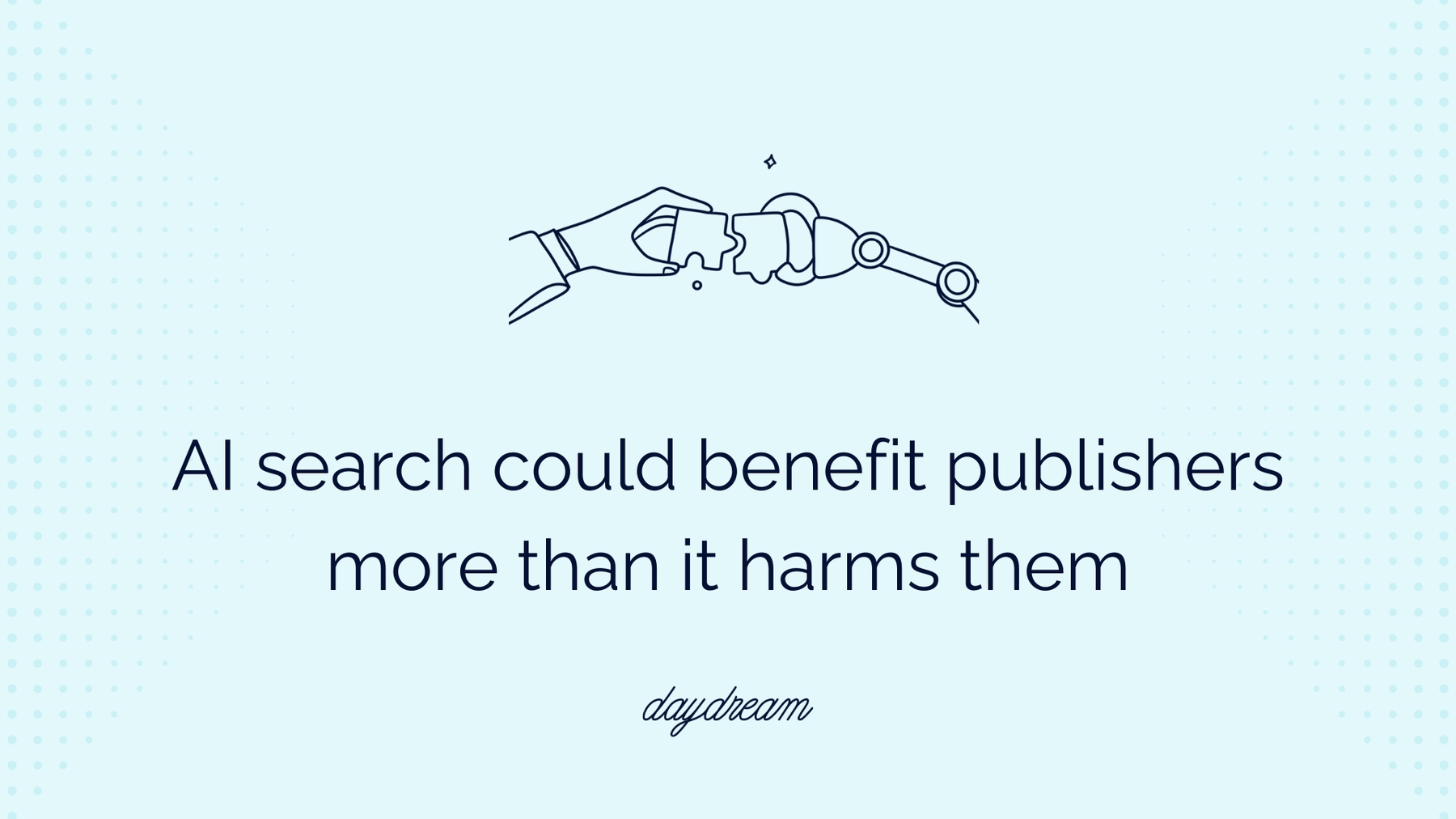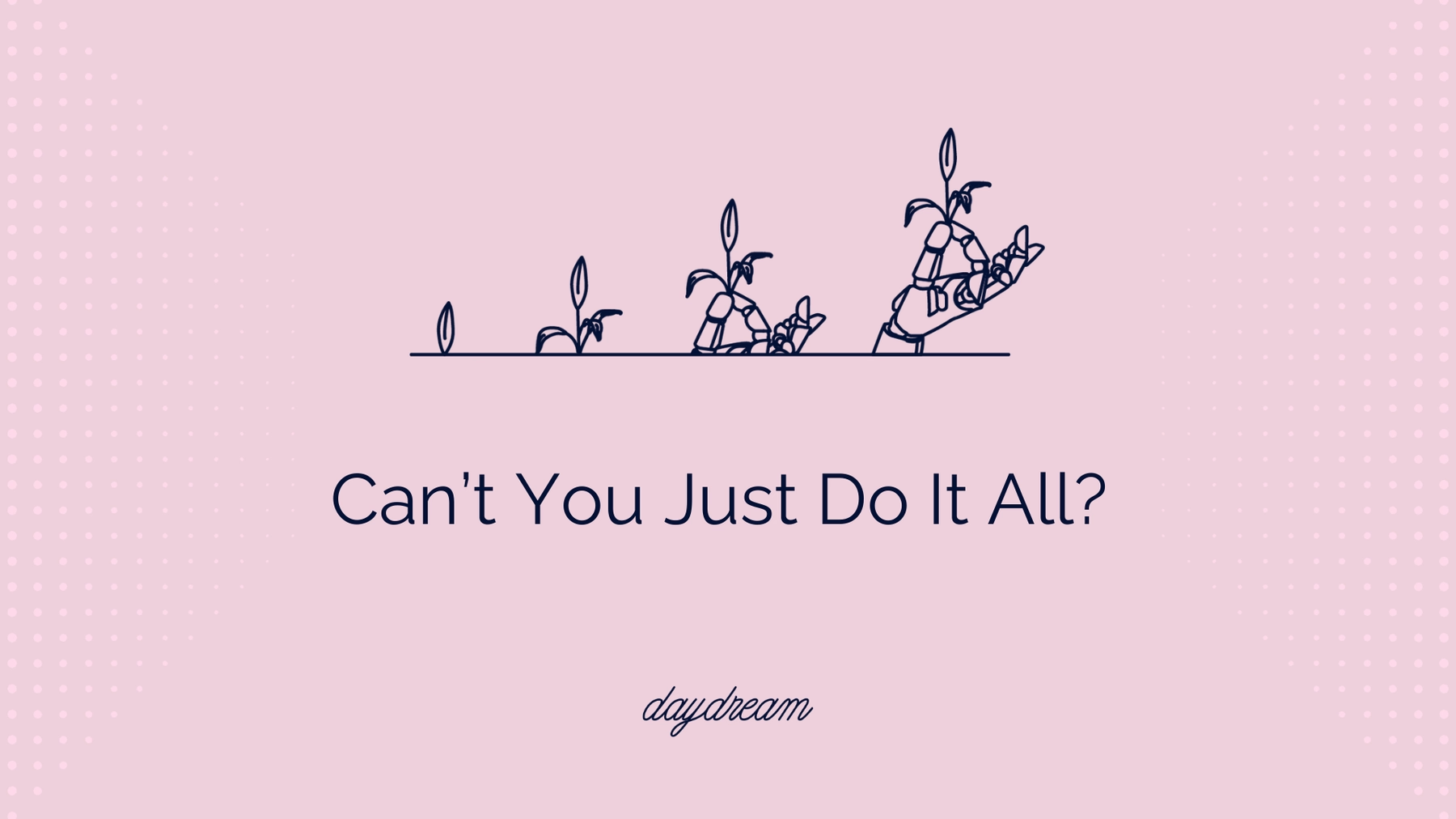AI search could benefit publishers more than it harms them
In the previous era of search, Google was successful in building a system of incentives to create mutually beneficial relationships between users, Google, and publishers. Today, that balance is being disrupted as new search interfaces like SearchGPT and Perplexity surface answers to questions without ten blue links.

In the previous era of search, Google was successful in building a system of incentives to create mutually beneficial relationships between users, Google, and publishers. Today, that balance is being disrupted as new search interfaces like SearchGPT and Perplexity surface answers to questions without ten blue links.
These events point to an existential dilemma for SEO. If these new search experiences send less traffic back to publishers, it’s unlikely that publishers will stay quiet as they receive less value for the content they produce. Forbes' recent legal threats to Perplexity are the latest example, while The New York Times has already moved forward with suing OpenAI.
In a piece I wrote nearly a year ago, I argued that in order to create the highest quality search product, search experiences would need to balance the value equation for publishers. Without access to the highest-quality data sources, you simply cannot provide the best answers for users.
Fast-forward to today, and the era of LLMs working hand-in-hand with publishers appears to have arrived — and it’s looking better than the models of the past. While Google never compensated publishers for surfacing their content in search directly, Perplexity and OpenAI both seem intent on doing exactly that.
OpenAI leads the way
The details of OpenAI’s Preferred Publisher Program were recently leaked to AdWeek.
The program appears to allow select editorial partners to receive “priority placement” and “richer brand expression” in chat conversations in addition to financial incentives, which are split between two components: guaranteed value and variable value.
Guaranteed value compensates publishers for allowing OpenAI to access their data backlog. The variable value is dependent on how users engage with the content. Note how different this is from what Google currently does. Google sends traffic back to publishers but doesn’t pay them for engagement or indexing their web pages.
These partnerships with publishers seem to be the cornerstone of OpenAI’s much anticipated direct competitor to Google, SearchGPT. In the announcement, OpenAI placed significant emphasis on its commitment to fairly compensating publishers for their work. Here are a few key excerpts:
“SearchGPT will quickly and directly respond to your questions with up-to-date information from the web while giving you clear links to relevant sources.”
“We are committed to a thriving ecosystem of publishers and creators. We hope to help users discover publisher sites and experiences, while bringing more choice to search. For decades, search has been a foundational way for publishers and creators to reach users. Now, we’re using AI to enhance this experience by highlighting high quality content in a conversational interface with multiple opportunities for users to engage.”
They even include a quote from the CEO of The Atlantic, who had an excellent interview with The Verge a few weeks prior on why they partnered with OpenAI.
“AI search is going to become one of the key ways that people navigate the internet, and it's crucial, in these early days, that the technology is built in a way that values, respects, and protects journalism and publishers. We look forward to partnering with OpenAI in the process, and creating a new way for readers to discover The Atlantic.”
Nicholas Thompson, CEO of The Atlantic
Perplexity follows quickly
Perplexity announced its own publisher program less than a week after the release of SearchGPT. Its program differs from OpenAI’s in that it does not appear to offer a guaranteed value payment.
They do have an engagement-based revenue share model, but it seems to apply only when a publisher is surfaced in their ad-supported “relevant questions” feature. This differs from OpenAI’s program, which seems to pay preferred publishers for any query they appear in.
Nonetheless, this development appears to be the first step in what is likely to be a much longer and more comprehensive strategy to align publishers' interests with Perplexity's.
The future of publishers and AI search
While there’s still a lot to figure out about the future of publishers and AI search experiences, a few themes are emerging:
1. New economic models are being created to compensate publishers
As previously noted, publishers are now compensated for having their sources cited in search results and for licensing their data to LLMs. This contrasts sharply with Google’s model, where publishers do not receive direct payments for sharing their content or for how well their content performs.
While the internet has been awash in anxiety about AI's impact on publishers, these new economic models have the potential to make them better off than they were in the pre-LLM era.
2. It’s still unclear if AI search will send more referral traffic or less
On one hand, Microsoft has said that the Bing search preview sent more clicks to publishers than the traditional experience. Additionally, BrightEdge research shows that Perplexity’s referrals to brands and publishers grew by 40% every month of the first quarter and by 30% in April, May, and June.
That said, according to one estimate, SGE caused a 25% decline in search traffic across a 5000+ publisher network, while a Wall St. Journal article estimated that publishers would lose between 20% and 40% of all their traffic if SGE (Search Generative Experience) were fully rolled out.
3. Higher search volumes might balance reduced click-through rates to publishers
AI answer engines can respond to new, complex search queries in ways that traditional search engines weren’t able to. At Google’s annual marketing conference, they shared that the volume of searches with five or more words grew 1.5x faster than shorter queries.
This could indicate that users are becoming more accustomed to taking complex queries to search. If this leads to a sizable enough net increase in searches, it may offset a potential loss in clickthrough rates due to more answers becoming zero-click searches.
Thanks for reading!
If you enjoyed reading this piece, consider joining our waitlist or signing up for our newsletter. If you’d like to reach us, Let’s chat!
notes on AI, growth, and the journey from 0→n
The future of search is unfolding; don’t get left behind
Gain actionable insights in real-time as we build and apply the future of AI-driven SEO






